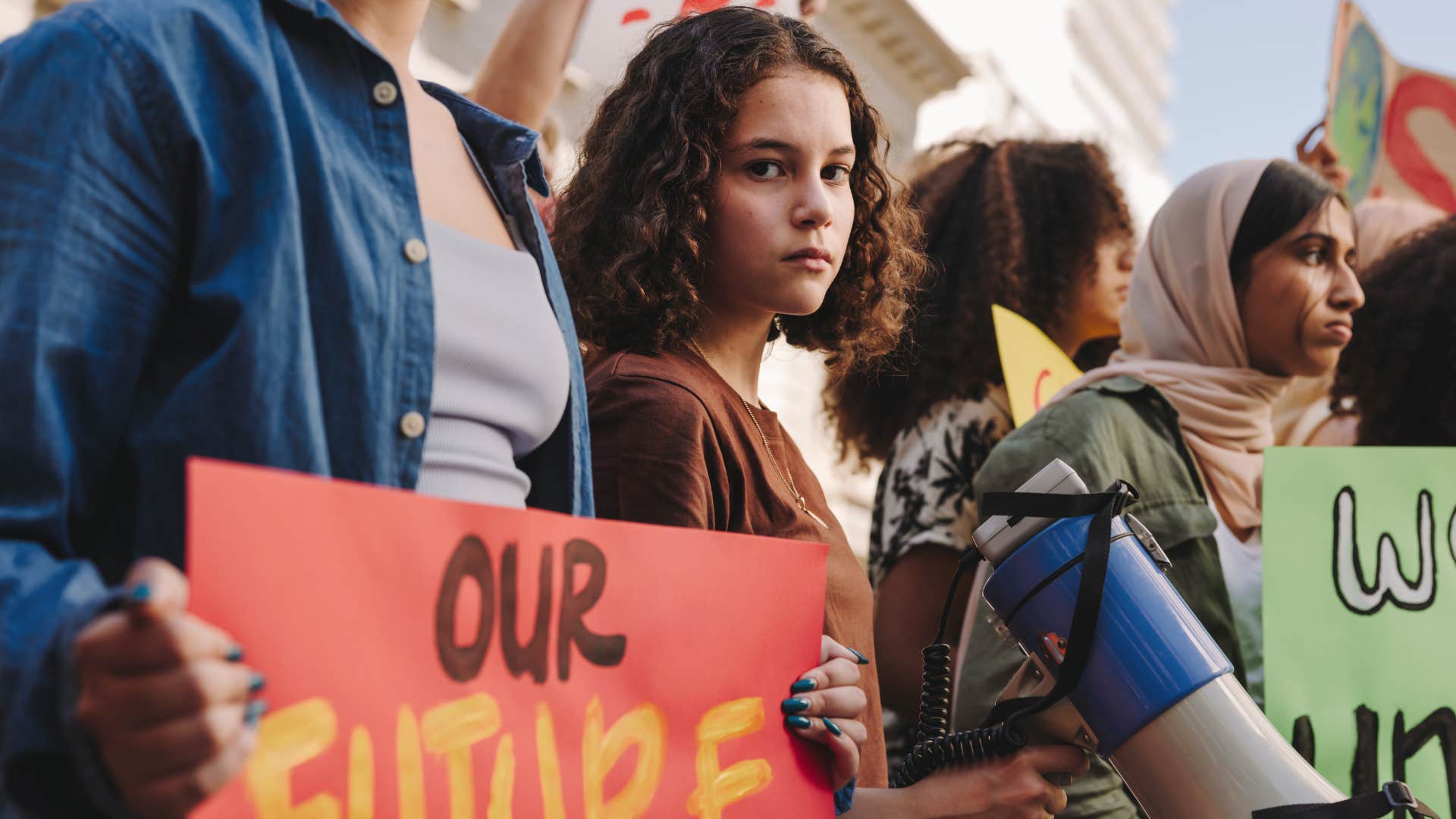11 Reasons Gen Z Thinks The American Dream Is Dead
It's not about hard work and grit anymore — it's about privilege.
 PeopleImages | Shutterstock
PeopleImages | Shutterstock While nearly half of Americans believe that the American dream was possible to achieve at one point, at least according to a study from Pew Research Center, most people today understand that it’s more fiction than fact. It could still stir up hope and motivation for the right people, but for the most part, the “bootstrap mentality,” hard work, and grit that characterize this fallacy aren’t a guarantee for success, or even security and comfort.
There are many reasons Gen Z thinks the American Dream is dead, from struggles with homeownership to job insecurity, and even an economic crisis that prevents them from starting a family or having kids of their own. While their grandparents might have been able to secure a job after college, settle down, and buy a home with a bit of sacrifice and hard work, not all young people today have that same freedom or choice — it’s about privilege and luck, not hard work and tenacity.
Here are 11 reasons Gen Z thinks the American Dream is dead
1. Hard work doesn't guarantee success for everyone
 CarlosBarquero | Shutterstock
CarlosBarquero | Shutterstock
Hard work has simply become the bare minimum necessity in many places, including the workplace. You have to work hard and strive for greatness if you want to get anywhere, but simply working a lot or being a passionate employee isn’t the only key to success — there’s a whole other level of skill, privilege, connection, and competency.
That’s why this fallacy of hard work is one of the reasons Gen Z thinks the American Dream is dead. Not only does the “bootstrap mentality” — that one person can pull themselves up by their bootstraps, toward success, with the right work ethic — not actually work, but it also tends to guilt people struggling with money or their career into believing they’re not doing enough.
2. Homeownership feels impossible
 fizkes | Shutterstock
fizkes | Shutterstock
Compared to a decade ago, more than 15 million people under 35 are still living with their parents, unable to shoulder both the cost of buying their first home or renting in the current economy. So many people are forced to choose between basic necessities and saving for rent or a mortgage.
While their grandparents could cut back on a little “fun” spending or eat a specific diet for a few months to save for a new place or getting a home, their Gen Z counterparts are overworking with little savings or emergency funds to show for it.
Partially due to stagnant wages and rising costs, it’s no surprise that the impossibility of homeownership is one of the reasons Gen Z thinks the American Dream is dead.
3. Going to college gave them debt, not a career
 fizkes | Shutterstock
fizkes | Shutterstock
Alongside other “doomspending” habits and their general credit reliance, it’s not surprising that Gen Zers have just experienced the greatest collective lowering of their credit scores within the last month.
They’re struggling to get their bearings in adulthood, especially with hundreds of thousands of dollars worth of debt, a lack of job security, and a world that’s less lucrative than they promised with a college degree.
Especially in the current sociopolitical environment, many Gen Zers have even more student loan burdens to fear in the near future, with recent political bills likely to increase the average payment by over $400 every month.
4. They don't have job security
 CarlosBarquero | Shutterstock
CarlosBarquero | Shutterstock
Even though they were promised a more lucrative career pool and a secure salary to pay off their student loans after getting a degree, it’s clear that many Gen Zers are struggling.
Not only do their expectations of flexibility, work-life balance, and general mental health accommodations make it hard to find a comfortable job in the current workforce, but they’re also feeling “left behind” by the promised American Dream that started with higher education.
Now, many Gen Zers are turning to “blue collar” jobs for financial independence, struggling to afford student loan payments and basic necessities in insecure jobs with stagnant wages.
5. They're working full-time with little to show for it
 insta_photos | Shutterstock
insta_photos | Shutterstock
Not only are many Gen Z workers lacking healthcare benefits, student tuition support, and a lucrative salary — the kinds of things they were promised by parents who received all of those things — they’re also struggling to keep their heads above water.
With little flexibility and the rate of rising costs, even affording groceries can feel like a stretch month-to-month after paying big bills, loans, and rent. Most are just one paycheck or bad phone call away from homelessness, even if their social media feeds and spending habits tell you otherwise.
6. They value and prioritize rest
 PeopleImages | Shutterstock
PeopleImages | Shutterstock
Gen Z often values protecting mental health and work-life balance in every facet of their life, more than older generations at the same age. They understand the nuances of burnout and the importance of protecting personal identity and time, which is part of why they think the American dream is dead — its form today turns people into “workers” over people.
They’re smart enough to know that, in some ways, today, the American Dream is actually predatory — used to keep marginalized and poor people “working hard” for the benefit of higher-income tax brackets, and at the expense of their personal well-being and mental health.
Rest is demonized in today’s society, but only for the poor. When rich people rest with millions of dollars in their pockets, it’s self-care, but when everyone else does it for their own well-being, it’s the “reason” they’re poor or an excuse to be lazy. That’s why the American Dream is dead, because its tenants only work for some — AKA the most privileged — people.
7. They've watched their planet get destroyed
 Jacob Lund | Shutterstock
Jacob Lund | Shutterstock
According to a study from Pew Research Center, young people — Gen Zers and millennials — lead the pack when it comes to climate change advocacy and change. They care about sustainability, mediating the impacts of climate change, and protecting their world for the future that their parents and grandparents got to enjoy with their own families.
However, older generations seem to be less concerned with climate change and the state of the planet, for many reasons. This generational gap is one of the reasons Gen Z thinks the American Dream is dead.
It’s supposed to offer equality and equal opportunities for everyone, yet the world they’re supposed to live, thrive, and start families within is quickly being polluted and overlooked by their older counterparts, unwilling to do anything about it. Of course, the generational divides over climate change aren’t as wide as they seem, but when it comes to action, young people are the ones leading the charge.
8. They can't afford to have a family
 Damir Khabirov | Shutterstock
Damir Khabirov | Shutterstock
When you think of the “white picket fence” American Dream, having a family is right up at the top, alongside hard work, a lucrative career, and higher education. However, most Gen Zers can’t afford to have a family at all; in fact, according to a Bank of America study, nearly half of Gen Zers are still staying afloat on financial assistance from their parents.
Of course, there are other lifestyle reasons why young people are choosing not to have kids, but for the most part, financial insecurity is keeping them from starting a family responsibly, even if they wanted to.
9. Social media paints an unrealistic picture
 Marian Fil | Shutterstock
Marian Fil | Shutterstock
From influencers posting dream vacations but struggling with debt behind the scenes, to watching the highlight reel of someone’s $500K wedding on Instagram, social media comparisons are part of the reason why Gen Z thinks the American Dream is dead.
It’s no longer about a humble foundation or security, but flaunting wealth, having “the next best thing,” and overspending for the sake of belonging that’s been taken away in real life. Gen Z doesn’t have access to third places without paying a cover charge, and even more struggle with feeling safe and appreciated when they’re not doomscrolling on the internet.
10. Wealth inequality
 Dragana Gordic | Shutterstock
Dragana Gordic | Shutterstock
The rising rates of wealth and income inequality have resulted in a shrinkage of the middle class, the dreamscape economic demographic for visualizations of the American Dream. Alongside a deepening of the gap between the rich and the poor, intergenerational mobility and class mobility have become more impossible than ever before.
So, not only are Gen Zers the most likely to stay stuck in the economic class they were born into, they’re also likely to manifest that struggle for the kids and families that come after them. There’s no longer a reality where “working hard” will get you into a better job or life — at least between economic classes — without luck, privilege, or connections.
11. The 'trickle down' promise isn't realistic anymore
 Prostock-studio | Shutterstock
Prostock-studio | Shutterstock
Like many other promises that have remained unrealized for the majority of Gen Zers, the promise of “trickle-down” policies and economics is even more unrealistic today. Especially in the modern world, where political influence is used to promote tax breaks for the ultra-rich and make life exponentially harder for the poorest Americans, the Gen Zers left to fend for themselves are unsupported.
In a true “American Dream,” the people who need help receive it. However, in the fallacy we’re currently living in, the rich get richer, and the poor get blamed.
Zayda Slabbekoorn is a senior editorial strategist with a bachelor’s degree in social relations & policy and gender studies who focuses on psychology, relationships, self-help, and human interest stories.

